Blog
Items filtered by date: October 2024
Why Does Pregnancy Cause Foot Pain?
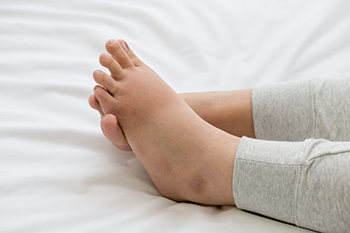
Pregnancy often brings a range of physical changes, and foot pain is a common complaint among expectant mothers. As the body prepares for childbirth, hormonal fluctuations cause ligaments to loosen, which can lead to instability in the feet and ankles. Additionally, the growing uterus increases weight and pressure on the feet, contributing to discomfort and swelling. The shift in the body's center of gravity during pregnancy can alter walking patterns, placing added stress on the feet. Edema, or swelling, commonly occurs due to fluid retention, causing feelings of heaviness and pain. Changes in foot shape, often resulting in wider and flatter feet, can also lead to discomfort. If you have developed foot pain while pregnant, it is suggested that you confer with a podiatrist who can help you to find relief during this transformative time.
Pregnant women with swollen feet can be treated with a variety of different methods that are readily available. For more information about other cures for swollen feet during pregnancy, consult with one of our doctors from Favor Foot Ankle Leg & Wound Center. Our doctors will attend to all of your foot and ankle needs.
What Foot Problems Can Arise During Pregnancy?
One problem that can occur is overpronation, which occurs when the arch of the foot flattens and tends to roll inward. This can cause pain and discomfort in your heels while you’re walking or even just standing up, trying to support your baby.
Another problem is edema, or swelling in the extremities. This often affects the feet during pregnancy but tends to occur in the later stages.
How Can I Keep My Feet Healthy During Pregnancy?
- Wearing orthotics can provide extra support for the feet and help distribute weight evenly
- Minimize the amount of time spent walking barefoot
- Wear shoes with good arch support
- Wear shoes that allow for good circulation to the feet
- Elevate feet if you experience swelling
- Massage your feet
- Get regular, light exercise, such as walking, to promote blood circulation to the feet
If you have any questions please feel free to contact our office located in South Amboy, NJ . We offer the newest diagnostic and treatment technologies for all your foot and ankle needs.
Biomechanics of the Ankle
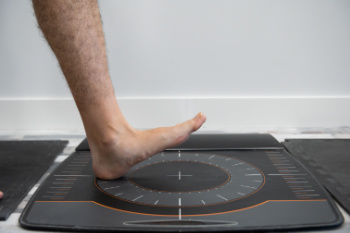
The ankle's movement and stability rely on bones, ligaments, and muscles working together. The main bones involved are the tibia, fibula, and talus. These form the ankle joint, which allows the foot to move up and down. Ligaments, like the deltoid, anterior talofibular, and calcaneofibular ligaments, help keep the ankle stable and control side-to-side movements. When we walk, the ankle flexes upwards when the heel touches the ground and pushes down as we lift the foot off. In cases of severe damage or arthritis, ankle replacement surgery may be needed, where the joint is replaced with artificial parts to restore movement. If you have ankle pain or discomfort, it is suggested that you schedule an appointment with a podiatrist who can diagnose the problem and recommend treatments to help you regain proper walking function and stability.
If you have any concerns about your feet, contact one of our doctors from Favor Foot Ankle Leg & Wound Center. Our doctors can provide the care you need to keep you pain-free and on your feet.
Biomechanics in Podiatry
Podiatric biomechanics is a particular sector of specialty podiatry with licensed practitioners who are trained to diagnose and treat conditions affecting the foot, ankle and lower leg. Biomechanics deals with the forces that act against the body, causing an interference with the biological structures. It focuses on the movement of the ankle, the foot and the forces that interact with them.
A History of Biomechanics
- Biomechanics dates back to the BC era in Egypt where evidence of professional foot care has been recorded.
- In 1974, biomechanics gained a higher profile from the studies of Merton Root, who claimed that by changing or controlling the forces between the ankle and the foot, corrections or conditions could be implemented to gain strength and coordination in the area.
Modern technological improvements are based on past theories and therapeutic processes that provide a better understanding of podiatric concepts for biomechanics. Computers can provide accurate information about the forces and patterns of the feet and lower legs.
Understanding biomechanics of the feet can help improve and eliminate pain, stopping further stress to the foot.
If you have any questions please feel free to contact our office located in South Amboy, NJ . We offer the newest diagnostic and treatment technologies for all your foot and ankle needs.
Care for Ingrown Toenails
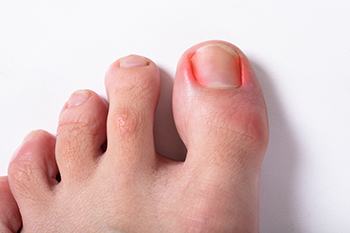
Ingrown toenails occur when the edge of the toenail grows into the surrounding skin, causing pain, swelling, and sometimes infection. This common condition usually affects the nail on the big toe and can result from improper nail trimming, wearing tight shoes, or injury to the toe. In some cases, a naturally curved nail shape increases the likelihood of developing an ingrown toenail. To prevent or treat ingrown toenails, it is important to trim nails straight across and avoid cutting them too short. Wearing shoes that provide enough room for your toes can also help. If left untreated, ingrown toenails can lead to more serious complications, such as infection, abscess formation, or even the need for surgical removal of part of the nail. If you have an ingrown toenail, it is suggested that you promptly visit a podiatrist who can offer you correct treatment.
Ingrown toenails can become painful if they are not treated properly. For more information about ingrown toenails, contact one of our doctors of Favor Foot Ankle Leg & Wound Center. Our doctors can provide the care you need to keep you pain-free and on your feet.
Ingrown Toenails
Ingrown toenails occur when a toenail grows sideways into the bed of the nail, causing pain, swelling, and possibly infection.
Causes
- Bacterial infections
- Improper nail cutting such as cutting it too short or not straight across
- Trauma to the toe, such as stubbing, which causes the nail to grow back irregularly
- Ill-fitting shoes that bunch the toes too close together
- Genetic predisposition
Prevention
Because ingrown toenails are not something found outside of shoe-wearing cultures, going barefoot as often as possible will decrease the likeliness of developing ingrown toenails. Wearing proper fitting shoes and using proper cutting techniques will also help decrease your risk of developing ingrown toenails.
Treatment
Ingrown toenails are a very treatable foot condition. In minor cases, soaking the affected area in salt or antibacterial soaps will not only help with the ingrown nail itself, but also help prevent any infections from occurring. In more severe cases, surgery is an option. In either case, speaking to your podiatrist about this condition will help you get a better understanding of specific treatment options that are right for you.
If you have any questions please feel free to contact our office located in South Amboy, NJ . We offer the newest diagnostic and treatment technologies for all your foot and ankle needs.
Reminder: When Was the Last Time...?
The Importance of Treating Athlete’s Foot
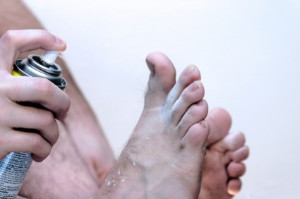
Tinea pedis, commonly known as athlete's foot, is a fungal infection that affects the skin on the feet, particularly between the toes. It causes itching, redness, peeling, and sometimes a burning sensation. Unlike other foot conditions like eczema or psoriasis, which are non-infectious, tinea pedis is contagious and spreads through direct contact or contaminated surfaces like locker rooms or shared footwear. This condition thrives in warm, damp environments, making it common among athletes or those who frequently wear tight, sweaty shoes. If you have a persistent or severe case of athlete’s foot, it is suggested that you schedule an appointment with a podiatrist who can prescribe antifungal medications, both topical and oral, and provide guidance on preventing recurrence. This type of doctor may also assess if there is a secondary infection or other underlying conditions complicating the healing process.
Athlete’s foot is an inconvenient condition that can be easily reduced with the proper treatment. If you have any concerns about your feet and ankles, contact one of our doctors from Favor Foot Ankle Leg & Wound Center. Our doctors will treat your foot and ankle needs.
Athlete’s Foot: The Sole Story
Athlete's foot, also known as tinea pedis, can be an extremely contagious foot infection. It is commonly contracted in public changing areas and bathrooms, dormitory style living quarters, around locker rooms and public swimming pools, or anywhere your feet often come into contact with other people.
Solutions to Combat Athlete’s Foot
- Hydrate your feet by using lotion
- Exfoliate
- Buff off nails
- Use of anti-fungal products
- Examine your feet and visit your doctor if any suspicious blisters or cuts develop
Athlete’s foot can cause many irritating symptoms such as dry and flaking skin, itching, and redness. Some more severe symptoms can include bleeding and cracked skin, intense itching and burning, and even pain when walking. In the worst cases, Athlete’s foot can cause blistering as well. Speak to your podiatrist for a better understanding of the different causes of Athlete’s foot, as well as help in determining which treatment options are best for you.
If you have any questions please feel free to contact our office located in South Amboy, NJ . We offer the newest diagnostic and treatment technologies for all your foot and ankle needs.
Causes and Treatment of Foot Ulcers
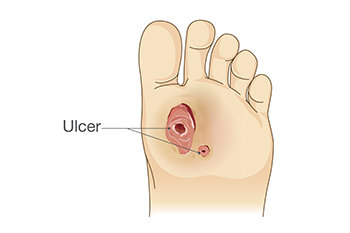
Foot ulcers are open sores or wounds that typically develop on the bottom of the foot and can result from poor circulation or prolonged pressure. They are often linked to conditions like peripheral neuropathy, arthritis, and Raynaud's phenomenon. Peripheral neuropathy reduces sensation in the feet, making it difficult to detect injuries, while poor circulation from conditions like Raynaud's delays healing. Arthritis can increase the risk of pressure ulcers by altering foot mechanics. If untreated, foot ulcers can lead to severe infections, including gangrene, possibly resulting in amputation. Symptoms include swelling, redness, drainage, and pain surrounding the wound. Diagnosis involves physical examination and tests to assess circulation and nerve function. Treatment includes wound care, offloading pressure, managing underlying conditions, and sometimes surgery. Healing time varies, from weeks to months, depending on the ulcer's severity and the patient's overall health. If you have developed a foot ulcer, it is strongly suggested that you schedule an appointment with a podiatrist for treatment.
Wound care is an important part in dealing with diabetes. If you have diabetes and a foot wound or would like more information about wound care for diabetics, consult with one of our doctors from Favor Foot Ankle Leg & Wound Center. Our doctors will assess your condition and provide you with quality foot and ankle treatment.
What Is Wound Care?
Wound care is the practice of taking proper care of a wound. This can range from the smallest to the largest of wounds. While everyone can benefit from proper wound care, it is much more important for diabetics. Diabetics often suffer from poor blood circulation which causes wounds to heal much slower than they would in a non-diabetic.
What Is the Importance of Wound Care?
While it may not seem apparent with small ulcers on the foot, for diabetics, any size ulcer can become infected. Diabetics often also suffer from neuropathy, or nerve loss. This means they might not even feel when they have an ulcer on their foot. If the wound becomes severely infected, amputation may be necessary. Therefore, it is of the upmost importance to properly care for any and all foot wounds.
How to Care for Wounds
The best way to care for foot wounds is to prevent them. For diabetics, this means daily inspections of the feet for any signs of abnormalities or ulcers. It is also recommended to see a podiatrist several times a year for a foot inspection. If you do have an ulcer, run the wound under water to clear dirt from the wound; then apply antibiotic ointment to the wound and cover with a bandage. Bandages should be changed daily and keeping pressure off the wound is smart. It is advised to see a podiatrist, who can keep an eye on it.
If you have any questions, please feel free to contact our office located in South Amboy, NJ . We offer the newest diagnostic and treatment technologies for all your foot care needs.

